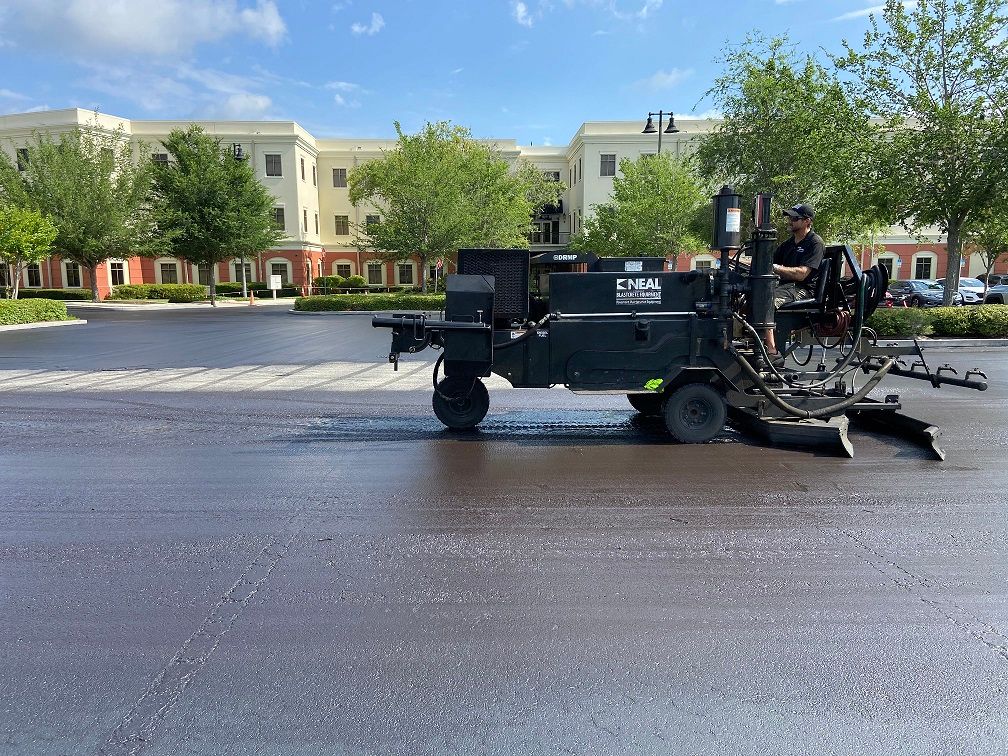

Winter weather can be tough on Florida roads and driveways, but many property owners don't realize that even mild temperature fluctuations can cause serious damage to asphalt surfaces. The freeze-thaw cycle—a natural process where water freezes and expands, then melts and contracts—creates a destructive pattern that weakens asphalt over time.
Understanding how this process works and taking preventive measures can save you thousands of dollars in costly repairs down the road. Whether you're managing a commercial parking lot or maintaining your home's driveway, knowing the signs of freeze-thaw damage and how to prevent it will help protect your investment.
Freeze-thaw cycles occur when temperatures fluctuate above and below the freezing point of water (32°F). During this process, water seeps into small cracks and pores in the asphalt. When temperatures drop, this water freezes and expands by approximately 9%, creating tremendous pressure within the pavement structure.
As temperatures rise again, the ice melts and contracts, leaving behind slightly larger openings. This repeated expansion and contraction gradually widens existing cracks and creates new ones, leading to progressively more severe damage with each cycle.
Even in Florida's relatively mild climate, overnight temperature drops during winter months can trigger freeze-thaw cycles, particularly in the early morning hours when temperatures are lowest.
The most visible sign of freeze-thaw damage is surface cracking. Water infiltration followed by freezing creates internal pressure that exceeds the tensile strength of asphalt, causing it to crack from the inside out. These cracks typically start small but expand rapidly with repeated freeze-thaw events.
Once cracks allow more water to penetrate deeper into the pavement structure, freeze-thaw cycles can affect the base materials beneath the asphalt. This weakens the foundation, causing chunks of asphalt to break away and form potholes—one of the most expensive types of asphalt damage to repair.
The edges of asphalt surfaces are particularly vulnerable to freeze-thaw damage because they have more exposure to moisture and temperature fluctuations. Edge deterioration often begins as small cracks but can quickly progress to significant chunks breaking away from the main surface.
Beyond visible surface damage, repeated freeze-thaw cycles compromise the overall structural integrity of asphalt. The constant expansion and contraction loosens the aggregate materials and breaks down the binding agents, making the entire surface more susceptible to other forms of damage like traffic wear and chemical degradation.
Applying a protective seal coat every 2-3 years creates a waterproof barrier that prevents water from penetrating into the asphalt. This is one of the most effective ways to prevent freeze-thaw damage. Quality seal coating products fill minor surface imperfections and provide a smooth, protective layer that sheds water rather than absorbing it.
Addressing small cracks immediately prevents them from becoming larger problems. Professional crack sealing involves cleaning out debris and applying specialized sealant materials that flex with temperature changes. This prevents water infiltration that leads to freeze-thaw damage.
Ensuring water drains away from asphalt surfaces quickly reduces the amount of moisture available to cause freeze-thaw damage. This might involve installing or improving drainage systems, adjusting surface grades, or adding permeable materials around pavement edges.
Prevention starts with proper installation. Using appropriate asphalt thickness for the intended load, ensuring proper compaction, and installing adequate base materials all contribute to a surface that's more resistant to freeze-thaw cycles.
Look for network-like crack patterns, particularly after winter weather. These "alligator cracks" indicate that freeze-thaw cycles have compromised the pavement structure and professional asphalt repairs are needed.
Areas where water pools on your asphalt surface are prime candidates for freeze-thaw damage. These spots should be addressed through resurfacing or drainage improvements before winter weather arrives.
Rough, pitted, or uneven surface textures often indicate that freeze-thaw cycles have begun breaking down the asphalt binder. Early intervention can prevent more extensive damage.
If the edges of your asphalt surface are beginning to break away or crumble, freeze-thaw damage may be the culprit. This type of deterioration typically accelerates quickly without professional intervention.
While some minor maintenance tasks can be handled by property owners, significant freeze-thaw damage requires professional expertise. Complex crack patterns, structural damage, or widespread surface deterioration should be evaluated by experienced asphalt contractors who can recommend appropriate repair strategies.
Professional contractors have access to commercial-grade materials and equipment that provide longer-lasting repairs than consumer products. They can also identify underlying issues that might not be obvious to untrained eyes, such as base layer problems or drainage deficiencies.
Freeze-thaw cycles pose a serious threat to asphalt surfaces, but with proper prevention and timely repairs, you can significantly extend the life of your pavement. Regular maintenance, quality materials, and professional expertise are your best defenses against winter weather damage.
Don't wait until minor cracks become major problems. Taking action now can save you significant repair costs and ensure your asphalt surfaces remain safe and functional for years to come.
If you need professional asphalt repairs in Port Orange, FL, contact Florida Sealcoating today for free estimates.
Get a free, no-obligation estimate for your asphalt project. Our team is ready to help protect and enhance your property.
(407) 942-3681